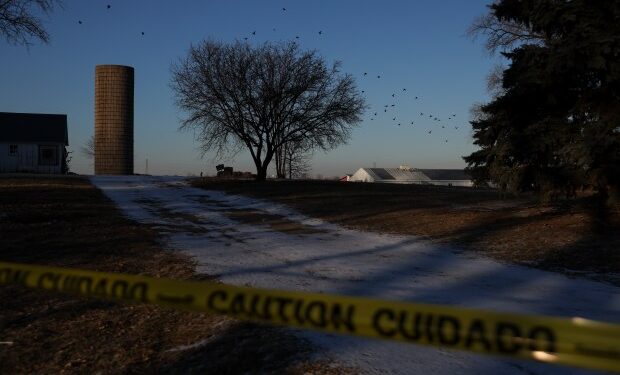Farmers at Kakadoodle, a family chicken farm in south suburban Matteson, were in its coops on a recent Sunday because a water pipe had frozen when they discovered about 30 dead birds.
MariKate Thomas, who owns Kakadoodle with her husband, said that at first they thought the deaths were tied to the low temperatures.
“It was right when the weather was shifting,” Thomas said. “It was getting really cold, and so we were just thinking it was the cold weather.”
When they returned to the coops the next day, they found hundreds of dead hens, she said.
When they returned the day after that, hundreds more had died. By Friday night, testing confirmed the hens were dying of bird flu. By the time a team of U.S. Department of Agriculture workers in hazmat gear came out to the farm Saturday to kill the remaining hens, only about 500 still were alive, Thomas said. About 2,500 were already gone.
Though the couple did not expect their farm to face an outbreak, they had started taking precautions a few days before the flock was infected, such as giving their hens garlic and apple cider vinegar to help boost their immune systems, Thomas said.
“I was hoping that we wouldn’t get affected by it, but four days later, we were in it,” she said. It’s just mind-numbing, just the whole sequence of events, how quickly it hit us and where we are now with it today.”
Avian influenza, commonly called bird flu, is a viral infection that spreads in birds, cows and other animals, according to the Cleveland Clinic. The hens of the Thomas flock are among the millions of wild and domestic birds that have died over the last two years worldwide. Bird flu also has killed sea lions, wiped out mink farms and taken out cats, dogs, skunks, foxes and even a polar bear. A flamingo and a harbor seal at the Lincoln Park Zoo also recently were taken down by bird flu.
The Associated Press reported Sunday that in the last month the virus had been detected in 84 commercial and backyard flocks in the U.S., with 10.7 million birds on those sites.
While human cases are rare and found mostly among farmworkers, one person has died from bird flu — a Louisiana man over age 65 who was hospitalized with severe respiratory symptoms.

Thomas believes the hens were infected by wild birds that got into the chicken feed.
“We tried to have … a noise thing to try to keep the wild birds away,” she said. “But when you have pasture-raised poultry, it’s difficult.”
Carol Cardona, a University of Minnesota avian health professor, said that although there are precautions farmers can take to prevent infection, once it begins to spread through a flock on a single farm, it’s extremely difficult to stop.
The best way for farmers to protect their flocks is by practicing biosecurity, Cardona said. That involves keeping feed protected from wild birds by storing it indoors, limiting contact with visitors who may have been around infected animals and preventing hens from accessing bodies of water where wild birds have roosted, she said.
After the outbreak, Kakadoodle was put under a 150-day quarantine, Thomas said, meaning they cannot grow produce or raise hens on the farm until June.
While most of the farm’s revenue came from egg sales, with Kakadoodle’s chickens producing close to 2,000 eggs each week, Thomas said she hopes the farm will fully recover.
“Through this whole process, we have realized that we have no control over what happens,” she said. “We can do the best we can, but at the end of the day … you’re working with Mother Nature.”
In the meantime, Thomas and her husband started a GoFundMe on Sunday that had raised just over $20,000 as of Thursday evening. The funds will be used to support Kakadoodle’s online marketplace and pay the farm’s employees, she said.
The money raised also will go toward a new $60,000 high tunnel chicken coop and to rebuild the farm’s flock, Thomas said.
“We are hoping to have a larger infrastructure where we can have our birds with their feed inside, so that they can remain safe,” Thomas said. “That way our chickens will be able to go outside and have free range, but then they’ll be inside for their feed, too.”

The flock’s decimation seems minor compared with the family’s experience about six years ago, when Thomas’ husband, Marty, developed non-Hodgkin lymphoma, a type of cancer that affects the lymphatic system.
The couple has four kids, and their youngest was 3 months old when Marty was diagnosed, Thomas said.
According to Thomas, non-Hodgkin lymphoma is linked to glyphosate exposure, a prevalent chemical in conventional farming. The Cleveland Clinic says “some research shows people exposed to certain high levels of pesticides, such as agricultural workers, may have a slightly increased risk of non-Hodgkin lymphoma.” The risk from low-level or periodic exposure is not certain.
Marty’s eventual triumph over cancer inspired the family to try to make locally sourced, healthy food more accessible. So they founded Kakadoodle — which wasn’t called cock-a-doodle because the domain name wasn’t available. Their farm raises chemical-free and antibiotic-free chickens, and their hens spend time in pastures.
In addition to its coops, Kakadoodle has a distribution center where it gathers products from other farms. Kakadoodle has about 500 customers that order on a weekly or biweekly basis, Thomas said.
She believes buying food sourced from local farms is vital.
“There’s things that are completely out of your control, and there needs to be more support and awareness around the work that farmers do and the risks that they take on,” Thomas said.
The Associated Press contributed.
Originally Published:






